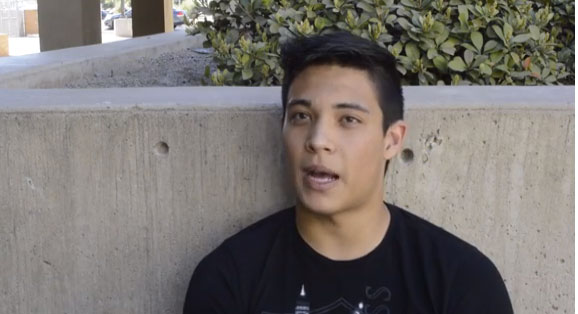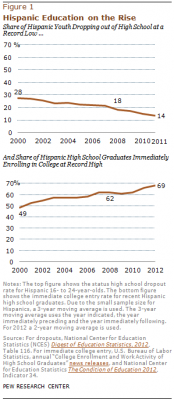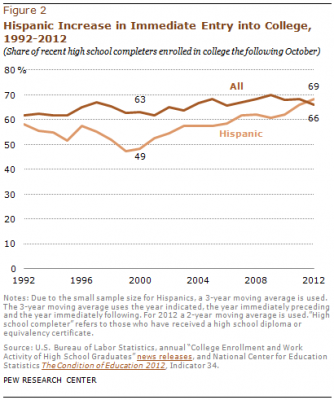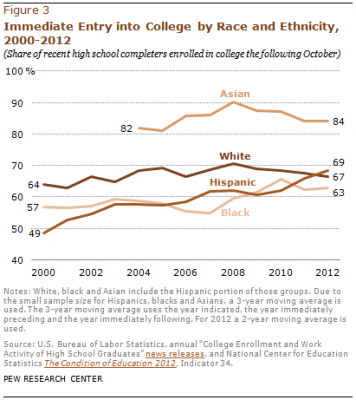EL PASO — Eight years ago, when 24-year-old Rosalie Aguirre moved from Durango, México to El Paso to receive an education, she had no idea of the multiple steps she would have to take to receive a bachelor’s degree.
After being held back one year at a local high school because of the language barrier, she decided to attend a two-year community college in El Paso first and then transfer to a four-year university.
Aguirre, who currently studies social work at El Paso Community College, said: “I was scared at first of going to a big university, so I decided to go to EPCC because they said that it was the best place to start.”
Aguirre has recently received her acceptance letter from The University of Texas at El Paso and she plans enroll next fall to obtain a bachelor’s degree in social work.
A recent study by Pew Research Center researchers Richard Fry and Paul Taylor shows that in 2012 the percentage of Hispanic high school graduates enrolling in four-year colleges or universities nationwide was higher than the number of white students enrolling in college after graduating from high school.

Christian Samble, a freshmen student who enrolled at EPCC during the fall semester of 2012, said he plans to transfer to UTEP later on. Photo credit: Jessica Salcedo
According to the Pew data, about 69 percent of Hispanic students enrolled in a college or university compared to 66 percent of white students.
As indicated by information provided by UTEP, there are three interrelated factors that contribute to the increase of Hispanic student college enrollment.
The first is the insistence of their parents that they pursue a baccalaureate degree because of the nation’s economic instability in the past years. Second is the overall growth of the Hispanic population in the U.S., with subsequent focus on their educational opportunities. Lastly, because of increased efforts by colleges and universities to recruit Latino students to pursue college degrees and succeed once they are in college. .
Despite the increase of Hispanic college enrollment in recent years, they are still half as likely as white students to complete a four-year college degree. About 11 percent of Hispanics in U.S. colleges finished a bachelor’s degree in comparison to 22 percent of white students between the ages of 22 to 24 in 2012.
El Paso has always had a historically high percentage of Hispanics enrolled in college because of the demographic composition of the area. According to the U.S. Census 2012 American Community Survey, 81 percent of the population in El Paso is Hispanic. In addition, because of the city’s border location and proximity to Ciudad Juarez, many students from Juarez attend EPCC and UTEP.
Dr. Carol Kay, director of institutional research at El Paso Community College said about 87 percent of the students at EPCC are Hispanic.
According to 2013 enrollment information provided by the University of Texas at El Paso, 9.1 percent of students are white and 79.4 percent of students are Hispanic origin.
According to Kay, Hispanic students in El Paso have a tendency to attend a two-year college first and then transfer to a four-year college to complete their bachelor’s degree.
Martin Sanchez, a counselor at El Dorado High School, said she has seen this trend at work at her school.
“The students from the graduating class of 2013 at El Dorado, about 45 percent of the students choose to go to a two-year college and 34 percent of students choose to go to a four-year college,” said Sanchez.
There aren’t many choices for students In El Paso, according to Sanchez. “It’s pretty much either EPCC or UTEP and I think that it depends on the commitment of the individual rather than the ethnicity if they complete a bachelor degree,” said Sanchez.
Data from the 2013 Texas Public Education Almanac shows that in 2012, 55.9 percent of students that graduated from UTEP were transfer students from two-year public colleges.
“I think it might be the atmosphere at the community college that appeals to Hispanics, because it provides a close knit community that they like and they feel more comfortable than they might feel at a four-year university,” said Kay.
Christian Samble, a freshmen student who enrolled at EPCC during the fall semester of 2012, said he plans to transfer to UTEP later on.
“The reason I came to a two-year-college is because I didn’t want the pressure of a big university, so I wanted to take small steps,” said Samble.
Fabiola Alvarez, a 19-year-old Hispanic student at EPCC, said she, “chose to attend a community college because it’s easier and cheaper.”
Alvarez is the second in her family to attend college. Her sister graduated from EPCC in 2013 with an associate’s degree and transferred to UTEP to pursue a bachelor’s degree in psychology.
Alvarez is hoping to follow in her sister’s steps and transfer to a four-year institution, probably UTEP, next year.
“I think that EPCC is the best place to start for Hispanics because if they transfer they will do better than going straight to UTEP,” said Kay.
EPCC encourages their students to transfer to four-year universities by having informational booths and transfer fairs in which students can get information not only about UTEP but also about other out-of-state universities such as NMSU or Sul Ross State University.
EPCC and UTEP have a close relationship in which almost all the classes taken at the community college will automatically transfer to UTEP and will count towards their major of choice,“UTEP graduates many Hispanics and El Paso is doing a good job over all with Hispanics and they are being quite successful,” said Kay.



